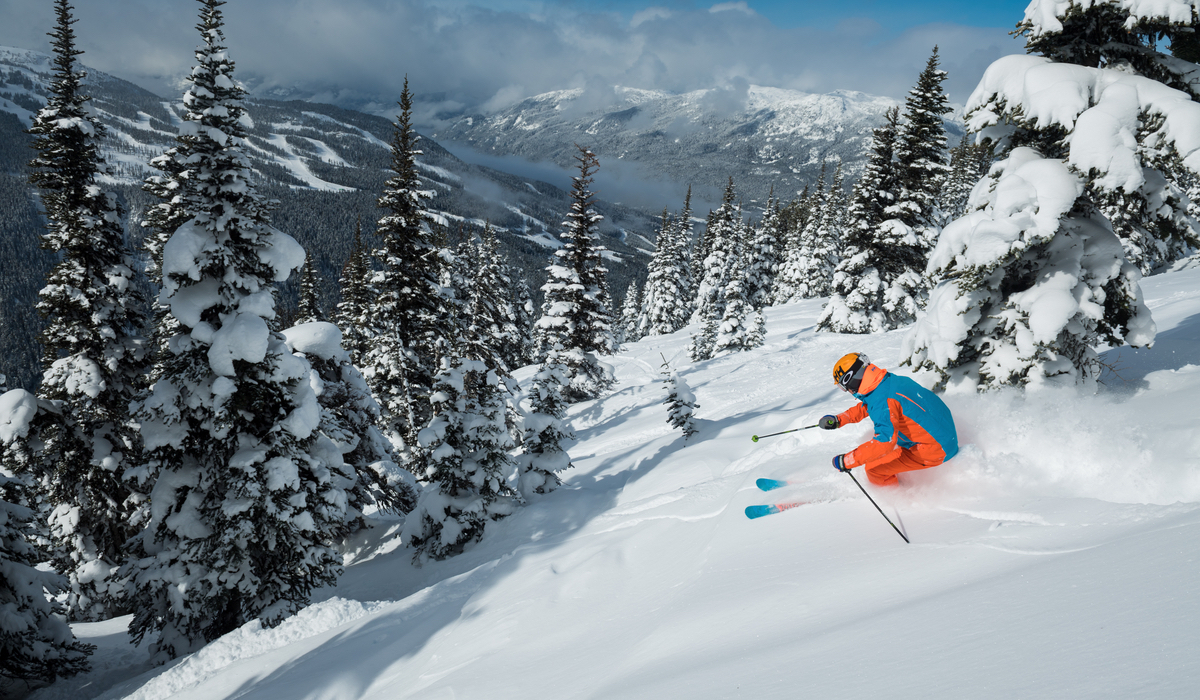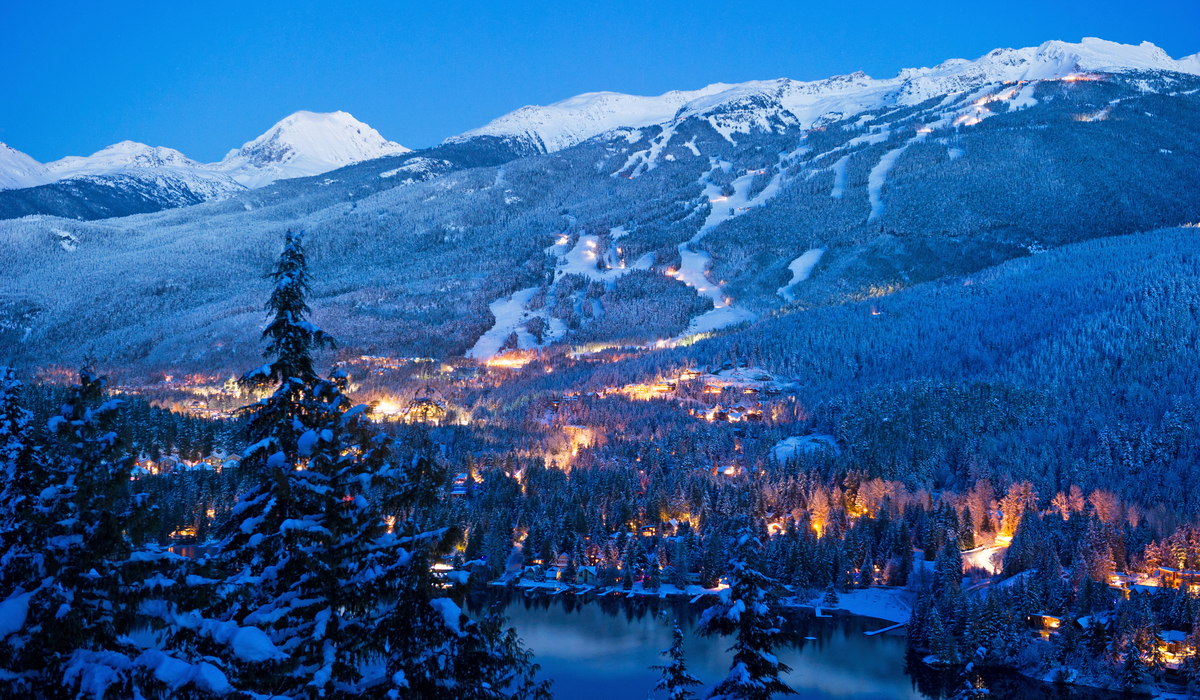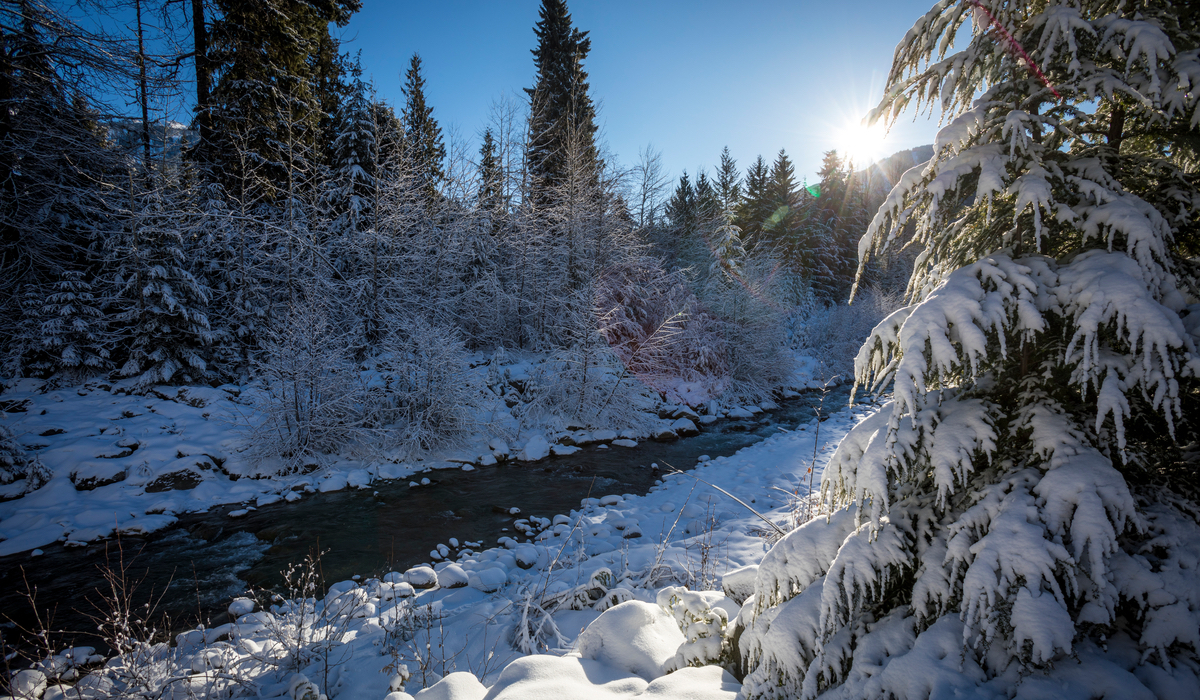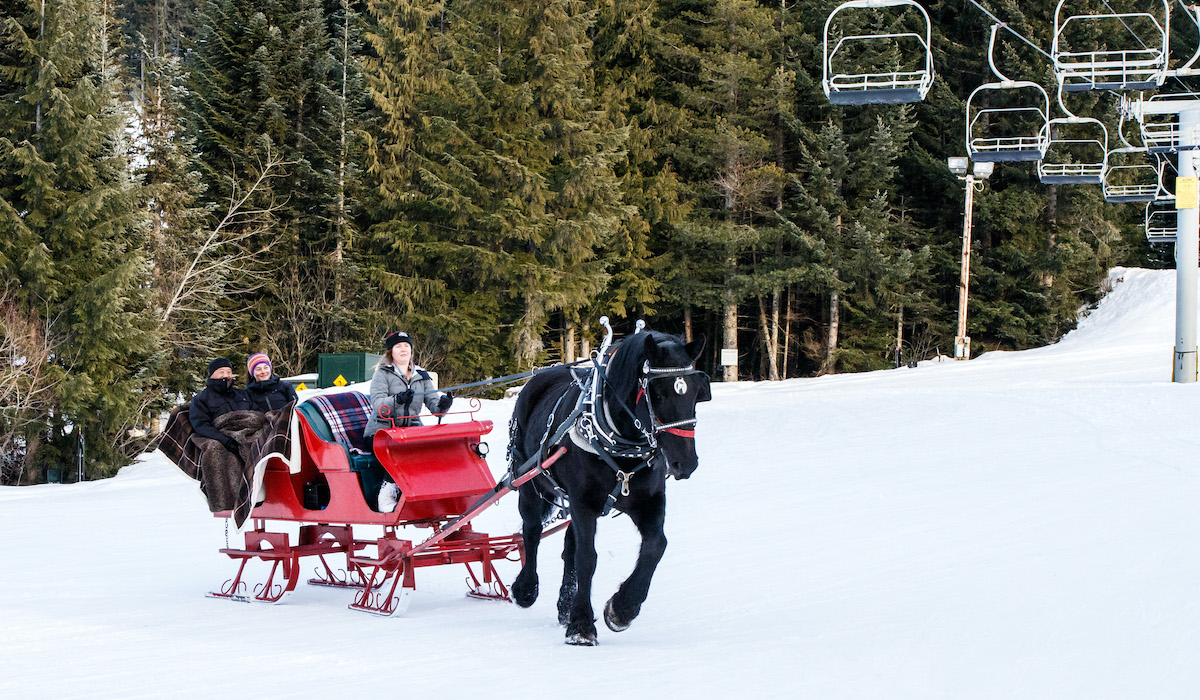By Rachael Hopwood
The story of Whistler is all about a place, its people and a special Olympic dream that came true in 2010. Located 120 kilometres north of Vancouver, this is an area of outstanding natural beauty and one of the world’s top tourism and ski destinations.
Climate change has been a key concern for the mountain town for many years, and with good reason. Whistler’s tourism-based economy relies on stable snow and weather patterns each year, to attract thousands of skiers and snowboarders to its slopes.

With the new winter season upon us, it seems a green skiing revolution is underway. In an attempt to cut our carbon footprint, many of us are seeking out eco-friendly travel options this winter.
While many resorts across the globe are making changes, here’s why the Canadian resort of Whistler should be high on the list of any carbon-savvy traveller.
Epic Promise for a Zero Footprint
Whistler Blackcomb’s owner (since 2016), Vail Resorts, is something of a giant in the skiing world. The company’s sustainability initiative, an Epic Promise for a Zero Footprint, is split into three parts to eliminate carbon emissions, waste production and environmental impact by 2030.
Changes like the use of low-energy snowmaking equipment and eco-friendly building design, tree planting, the sourcing of electricity from renewable energy sources and many offsetting programs will be in action this winter.

While promises are easy to make, it seems Vail Resorts are putting their money where their mouth is. They invested US$2.4 million into energy upgrades, including more LED lighting and 168 high-efficiency, automated snow guns.
This move alone led to a decrease of 37,511 million metric British thermal units and put it a quarter of the way towards its 2030 energy-efficiency goal.

The Fitzsimmons Micro-Hydro Project
In efforts to make Whistler’s energy consumption neutral, the Fitzsimmons micro-hydro renewable energy project has built a hydro plant that produces enough electricity to match the total annual energy consumption of the resort’s winter and summer operations. To put that into perspective, that’s enough to power 17 restaurants, 269 snow cannons, and 37 ski lifts!
Local Community & Small Businesses
The local community and small businesses play a huge role when it comes to Whistler’s carbon credentials. After all, their livelihood relies on maintaining this beautiful corner of Canada.
From May to October, the Resort Municipality of Whistler challenged residents to “Maytober.” Residents were asked to switch out one private passenger vehicle trip each week for a lower-carbon transportation alternative such as walking, transit or biking. The Whistler Tourism authority reported that the community could have reduced their climate footprint by as much as 600 tonnes as a result.

Forged Axe Throwing, an entertainment business in neighbouring Function Junction, repurposes its wooden targets by offering them as firewood.
Wood is regarded as a safe fuel and a greater alternative to oil and other fossil fuels. It also provides locals with an excuse to test their aim at one of the hour-long axe throwing drop-in sessions.

There are several Whistler adventures for those seeking to limit their carbon footprint. A Whistler sleigh ride uses good old-fashioned horsepower and offers a great way to see the sights without polluting backcountry habitats.

Tubing is another planet-friendly pastime to add to the list. Easily accessible from the Village, the Whistler Blackcomb Tube Park is the best place to slide your way over 1,000 feet of ice lanes.

With more and more people cutting meat out of their diet for reasons of sustainability, Meat-free Mondays at the Aura Restaurant will be music to the ears of vegetarians and vegans.

When it comes to eco-friendly accommodation, the Nita Lake Lodge is hard to ignore. Their stunning lakeside location is perhaps a reminder of what our efforts are designed to protect. And they host amazing sleep retreats.
Nita Lake has several initiatives, including growing its herbs and vegetables on an organic rooftop garden, using energy-efficient lighting, a policy of using chemical-free cleaning products, a comprehensive recycling program, and energy-efficient boilers.
So there you have it, just a few of the efforts being taken by Whistler Tourism to preserve this beautiful part of Canada for years to come. By taking collective action, our thirst for adventure doesn’t have to threaten the environment.
About Whistler Tourism
Whistler, located in the beautiful Coast Mountains of British Columbia, Canada, is a world-renowned destination that attracts visitors from across the globe.
As a premier tourism hotspot, Whistler offers a wealth of recreational activities, stunning natural landscapes, and a vibrant village atmosphere, making it a year-round destination for outdoor enthusiasts, adventure seekers, and those looking for a memorable vacation experience.
One of Whistler’s main attractions is its world-class ski and snowboarding opportunities. With two mountains, Whistler and Blackcomb, linked by the PEAK 2 PEAK Gondola, the region offers over 8,000 acres of skiable terrain and an extensive network of trails for all skill levels. The winter season, from late November to April, showcases Whistler’s legendary powder snow, making it a haven for winter sports enthusiasts.
During the summer months, Whistler transforms into a playground for outdoor activities. The mountains become a haven for hikers and mountain bikers, with an extensive trail network providing access to stunning alpine vistas, serene lakes, and old-growth forests. The valley is also famous for golfing, fishing, zip-lining, whitewater rafting, and exploring the scenic beauty of the surrounding area.
Beyond its natural attractions, Whistler boasts a vibrant village atmosphere that caters to visitors’ needs. The pedestrian-only Whistler Village is a bustling hub with shops, restaurants, bars, and art galleries. Visitors can enjoy world-class dining, from international cuisine to locally sourced fare, lively nightlife and entertainment options.
Whistler is also known for hosting major events and festivals throughout the year. The most famous of these is the Whistler Film Festival, which attracts filmmakers, industry professionals, and film enthusiasts. Other notable events include the Whistler Crankworx mountain biking festival, the Whistler Writers Festival, and various sporting competitions.
For those seeking relaxation and rejuvenation, Whistler offers a range of wellness and spa experiences. Visitors can unwind in luxurious spas, enjoy yoga and meditation classes, or indulge in wellness treatments inspired by nature and local traditions.
Furthermore, Whistler prides itself on its commitment to sustainability and environmental stewardship. The destination has received numerous awards and certifications for its efforts in preserving the natural environment and implementing sustainable practices.
With its stunning natural beauty, world-class recreational opportunities, vibrant village atmosphere, and commitment to sustainability, Whistler has established itself as a premier tourism destination. Whether you are seeking adventure, relaxation, or a memorable getaway, Whistler offers a wealth of experiences and attractions to suit every traveller’s preferences.
10 Tips for Eco-Friendly Travel to Whistler
- Choose eco-friendly accommodations: Look for accommodations in Whistler that prioritize sustainability, such as hotels with green certifications or eco-lodges focusing on minimizing their environmental impact.
- Use public transportation or carpool: Utilize the efficient public transportation system in Whistler, including buses and shuttles, to explore the area. If you need to drive, consider carpooling with other travellers to reduce emissions.
- Opt for non-motorized transportation: Take advantage of Whistler’s bike-friendly infrastructure and rent bicycles to get around the village and explore the nearby trails. Walking or using electric scooters are also environmentally friendly alternatives.
- Conserve water and energy: Practice water and energy conservation in your accommodation by turning off lights, electronics, and air conditioning when not in use. Reuse towels and linens to minimize water consumption.
- Pack a reusable water bottle and shopping bag: Reduce plastic waste by carrying a reusable water bottle to refill at water fountains and a reusable shopping bag for any purchases during your stay.
- Support local and sustainable dining: Choose restaurants and cafes prioritizing locally sourced, organic, and sustainable food options. Support establishments that minimize single-use plastics and prioritize waste reduction.
- Recycle and dispose of waste responsibly: Familiarize yourself with Whistler’s recycling and waste disposal guidelines. Separate your recyclables and dispose of garbage in designated bins to ensure proper recycling practices.
- Respect wildlife and natural areas: When exploring Whistler’s wilderness, follow Leave No Trace principles by staying on designated trails, avoiding disturbing wildlife, and properly disposing of waste.
- Choose eco-friendly activities: Participate in nature-friendly activities such as hiking, wildlife viewing, or kayaking while respecting the environment and wildlife. Avoid activities with negative environmental impacts, such as off-trail hiking or wildlife exploitation.
- Educate yourself about local sustainability initiatives: Learn about Whistler’s sustainability efforts and initiatives, such as the resort’s commitment to reducing greenhouse gas emissions or wildlife conservation programs. You can contribute to the destination’s eco-friendly practices by understanding and supporting these initiatives.
Remember, being an eco-friendly traveller in Whistler involves making conscious choices that minimize your environmental impact and support the preservation of the area’s natural beauty for future generations to enjoy.


